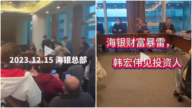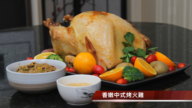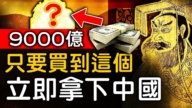【新唐人北京時間2018年09月18日訊】【世事關心】(480)保持台灣獨立於中共之戰:中國大陸正在進行史上最全面的軍備重整,意欲何為?為了影響台灣,中共政府還採取了哪些措施?2019年的國防授權法是否真能助力台灣,並嚇阻中共呢?
中國大陸正在進行史上最全面的軍備重整,意欲何為?
China is undergoing the most comprehensive military restructuring in its history. What’s the goal?
Ian Easton(2049研究所研究員):「它是對臺灣的全面入侵和佔領,它是針對中華民國臺灣。」
Ian Easton: 「It’s the full-scale invasion and occupation of Taiwan, an operation that it would have to conduct against the Republic of China, or Taiwan.」
為了影響臺灣,中共政府還採取了哪些措施?
What else is the Chinese Communist regime doing to gain influence in Taiwan?
J. Michael Cole(台灣安全分析師): 「臺灣是目標。在臉書上,每天有2400條謠言的攻擊。每天2400條,全部都來自中國大陸。」
J. Michael Cole: 「Taiwan is targeted – on Facebook – is targeted by 2,400 individual disinformation attacks if I can use that term. 2,400 every day, all of which originates somewhere in China.」
2019年的國防授權法是否真能助力臺灣並嚇阻中共呢?
Is the National Defense Authorization Act of 2019 capable of helping Taiwan and deterring China?
Ian Easton(2049研究所研究員):「有許多非常重要的舉措。如果川普政府真能遵照執行,我認為將產生非常非常積極的影響。」
Ian Easton: 「There’s a lot of very important initiatives that are in there. And if the Trump administration did act upon all of those, I do think it would make a very, very positive impact.」
蕭茗(Host/Simone Gao):歡迎收看《世事關心》,我是蕭茗。 從諸多方面來看,鮮有國家像臺灣那樣對美國的政治制度如此緊密地效仿。美國充滿活力的民主制度,重視言論自由和信仰自由。這與中國大陸的獨裁專制和一黨專政形成鮮明對比。如今,中共在努力加強軍備力量,試圖顛覆臺灣的民主制度。相應的,美國方面正調整對中國大陸的政策,並增進與臺灣的關係。這一集的《世事關心》,讓我們一起來了解中國大陸、臺灣和美國關係的變化。 中國大陸試圖怎樣顛覆臺灣的民主制度,他們將會對臺灣採取哪些措施。
Welcome to《 Zooming In》, I am Simone Gao. In many ways, no other nation has followed the United States’ political system as closely as Taiwan. It is a vibrant democracy that values freedom of speech and freedom of belief. It’s a stark contrast to mainland China’s authoritarian, one-party rule. Increasingly, the Chinese Communist Party is ramping up its military and trying to subvert Taiwan’s democratic system. Meanwhile, the United States is overhauling its China policy and increasing relations with Taiwan. In this episode, we’ll take a look at the changing relationship between China, Taiwan, and the United States. We’ll also discuss how China is trying to subvert Taiwan’s democratic system, and what should be done about it.
中國、臺灣和美國的關係史
Relations Between China, Taiwan, and the U.S. – a History
1949年中國共產黨控制中國大陸後,中華民國政府撤退到臺灣。直到20世紀70年代,聯合國和一些西方國家還都承認中華民國政府是中國的合法政府。1972年尼克松總統訪問中國大陸,最終導致美國與中華民國臺灣斷交。 1979年美國與北京關係正常化。
China’s Kuomintang (KMT) government fled to Taiwan in 1949 after the Chinese Communist Party took control of the mainland. The UN and Western countries recognized the KMT as China’s legitimate government until the 1970s. In 1972, President Nixon visited China which eventually led to the U.S. severing diplomatic ties with Taiwan and normalizing relations with Beijing in 1979.
儘管與臺灣的關係有了變化,美國一直是臺灣最大的支持者之一。 1979年,由美國國會起草的《與臺灣關係法》要求美國 「向臺灣提供防禦性武器」 ,同時「維持美國的能力,以抵抗任何訴諸武力、或使用其它強制手段,危及臺灣人民安全及社會經濟制度的行動。」 另一方面,如果中華人民共和國襲擊或入侵臺灣,該法案並不保證美國將在軍事上進行幹預。 1982年,里根總統同意六項保證,保證美國繼續支持臺灣。
Despite the change, the U.S. has always been one of Taiwan’s biggest supporters. In 1979, the Taiwan Relations Act, drafted by the U.S. Congress, requires the United States “to provide Taiwan with arms of a defensive character" and “to maintain the capacity of the United States to resist any resort to force or other forms of coercion that would jeopardize the security, or the social or economic system, of the people on Taiwan." On the other hand, the act does not guarantee the U.S. will intervene militarily if the PRC attacks or invades Taiwan. In 1982, President Reagan agreed to the Six Assurances, which ensured continued U.S. support to Taiwan.
今年二月,川普總統簽署了「臺灣旅行法」。 該法案允許臺美高級官員互訪。今年八月臺灣(中華民國)總統蔡英文兩次訪問美國。中共政府因此感到不安。
In February, President Trump signed the Taiwan Travel Act. It allows high-level Taiwan officials to visit the United States and vice versa. Taiwan President Tsai Ing-wen visited the U.S. twice in August (footage of her in TX), angering China’s Communist government.
隨著美臺關係的增強,其它一些國家卻和北京拉近了距離。自2017年以來,已有巴拿馬、多米尼加共和國、和薩爾瓦多與臺灣(中華民國)斷絕了外交關係。目前只有17個國家仍在外交上承認臺灣(中華民國)。
As U.S.-Taiwan ties strengthen, other countries are embracing Beijing. Since 2017, Panama, the Dominican Republic, and El Salvador (footage of El Salvador closing TW embassy) have cut diplomatic ties with Taiwan. Only 17 countries currently recognize Taiwan diplomatically.
今年八月,特朗普總統簽署了2019年國防授權法案。國防授權法案包含幾項親臺措施,比如支持美臺舉行聯合軍事演習和對臺軍援。
President Trump signed the 2019 National Defense Authorization Act in August. The NDAA had several pro-Taiwan elements supporting joint military exercises and support.
蕭茗(Host/Simone Gao):2019年的《國防授權法案》是否將幫助臺灣維持其國際地位,並阻止中國大陸對其主權的威脅?就該問題我們與2049項目的研究員Ian Easton展開了討論。
「 Will the 2019 NDAA help Taiwan maintain its international space and deter China’s threat to its sovereignty? I had a discussion with Ian Easton, Research Fellow at the Project 2049 Institute. 」
蕭茗(Host/Simone Gao):「今年八月特朗普總統簽署了2019國防授權法案,其中有許多在軍事領域支持臺灣的內容。你認為這樣足夠嗎?」
「 President Trump signed the 2019 National Defense Authorization Act in August, and there were a number of pro-Taiwan military elements in it. Do you think it is enough?」
Ian Easton(2049研究所研究員):「我認為這將是非常積極的。 這裡邊主要是國會在起作用,國防部只是按國會的要求提供了一份報告。授權法案中的其它內容基本都是國會的想法而已,它展示了我們的抱負、美國民眾的願望、對臺灣的支持,以及維護美國在西太平洋的國家利益的決心。國防授權法案非常好,如果你細看一下法案的內容,從支持醫院船訪問臺灣,到重申「臺灣關係法」,以及里根的對臺六項保證,你就會發現這個法案是美臺雙方在無邦交情況下,發展彼此關係的基石。法案還支持對臺軍售制度化,增加對臺軍售,加強兩軍之間的最高層溝通。有許多非常重要的舉措,如果川普政府真能遵照執行,我認為將產生非常非常積極的影響。然而,我擔心,由於長期的官僚惰性,這個過程可能會很慢,所以我不敢說國會的好建議都能在明年付諸實施。」
Ian Easton:「 I think it would be very positive. For the most part is the sense of congress, the only thing that Congress actually mandated the Department of Defense to do is to produce a report. Pretty much everything else in there is the sense of congress. It’s an expression of the aspirations, the hopes of the American people, an expression of support for Taiwan and for U.S. national interests in the western Pacific. But it’s very good. The language, if you look at it and you break down everything from supporting a potential hospital ship visit to Taiwan, to reaffirming the Taiwan Relations Act, and Reagan’s Six Assurances to Taiwan, it’s the bedrock for U.S.-Taiwan relations in the absence of official diplomatic ties. Everything from supporting regularized arms sales to Taiwan, increased arms sales to Taiwan, increased communications at the highest levels between our two militaries. There’s a lot of very important initiatives that are in there. And if the Trump administration did act upon all of those, I do think it would make a very, very positive impact. I worry, however, that because of longstanding bureaucratic inertia, that it may be slow. And so I’m not sure that all of the good things that are suggested by Congress will actually happen over the next year. 」
蕭茗(Host/Simone Gao):「臺灣在戰略上對美國有多重要?」
「 Can you elaborate on just how important Taiwan is to the U.S. strategically? 」
Ian Easton(2049研究所研究員):「對於美國來說,臺灣在兩個不同的層面上具有重要戰略意義。一個層面是原則和價值觀。臺灣與美國是志同道合的國家。它是一個民主國家,它推崇言論自由、宗教自由、集會自由,它認同美國理念的所有核心內容,認同我們自開國以來的全部歷史。這些是美國凝聚力的來源,也是我們歷史上成功的基礎。臺灣政府、中華民國政府在這些理念和價值觀上與我們有共識。從另一層面來講,排除價值觀考慮,臺灣具備地緣戰略的重要意義。這是我們冷靜、理性地計算如何維持美國的權力,影響力經濟實力而得出的結論。如果你看一下臺灣的位置,它位於第一個島鏈的中間,這是一個關鍵的地理位置,它坐落在世界上交通最繁忙的海上通信線路和通信航空公司之間,它佔據了重要的地緣戰略地形,在這個基礎上,美國根本不能失去這個臺灣。」
Ian Easton: 「Well, for the United States, Taiwan is important strategically on two different levels. One is the level of – it’s really the level of principles and values. Taiwan is a like-minded country for the United States. It’s a democracy, it values freedom of speech, freedom of religion, freedom of assembly, all of the core elements of American principles, all the things that our Founding Fathers and all the generations that have come since then, all of the intrinsic values that we have, the things that we hold to be sacred as a nation, and all the things that have made us very, very successful as a nation, the Taiwanese government, the Republic of China government, agrees with. Also, as a matter of geostrategic interest, this is less about values and more about our own cold, rational calculations of how do we maintain our power and our influence and our economic prosperity. If you look at Taiwan, its location, it’s situated in the middle of the first island chain, which is critical geography. It sits at the nexus of the world’s most heavily trafficked maritime lines of communication and airlines of communication. It occupies essential geostrategic terrain. This is a place that the United States simply cannot afford to lose on that basis as well. 」
蕭茗(Host/Simone Gao):「美國怎麽能真正幫助臺灣而不僅僅是擺個姿態呢? 例如,美國削弱與因中國而放棄與臺灣交好的那些國家的外交關系是個好辦法嗎?」
「 How can the United States really help Taiwan instead of just making symbolic gestures? For example, do you think downgrading the U.S. diplomatic relations with countries who dump Taiwan diplomatically for China is a good way to help Taiwan maintain its international space?」
Ian Easton(2049研究所研究員):「我想任何時候美國政府,特別是近期非常配合北京政權的美國國務院,無論何時他們抗議,或對北京政權,或向那些與北京靠攏的國家或公司進行外交抗議,我認為都是好事。然而,話雖如此,我仍然覺得美國政府因不滿或失望就對外宣洩憤怒是不公平的,因為這些國家包括美洲中部和南美國家,他們在經濟、政治、和外交上受到巨大的壓力。對於美國這個世界上最強大的國家而言,針對這些國家發怒毫無意義,因為問題的核心目標和根源是中華人民共和國,是北京。不負責任採取行動的是北京,是北京正在改變臺灣海峽和世界各地的現狀。北京正在孤立和疏遠臺灣,在世界舞臺上摧毀臺灣。因此,至少在我看來,對於美國政府,特別是國務院來說,更直接地表達對北京政權的不滿和失望更合適。而不是去針對南洲中部和南美國家而表示不滿與失望也許將來還涉及非洲或南太平洋國家。」
Ian Easton: 「Well, I think anytime the United States government, and especially the U.S. State Department, which until recently have been very, very accommodating to the regime in Beijing, anytime that they protest, anytime that they demarche the Chinese or they demarche countries or corporations or organizations that are cooperating with Beijing, I think that’s a good thing. However, having said that, I think that it is not fair for the U.S. government to take its own anger out, if that’s what it is, or its own disappointment out on those particular countries because we’re talking about countries in Central America and South America who are under tremendous stress economically, politically, and diplomatically. And it makes little sense for the United States, the strongest country in the world, to use those countries, and in effect to bully those countries when the true target of the problem, the root of the problem is the People’s Republic of China. It’s Beijing. It’s Beijing that is acting irresponsibly. It’s Beijing that is changing the status quo in the Taiwan Strait and around the world. It’s Beijing that is isolating and alienating Taiwan and silencing Taiwan on the world stage. And so it would make more sense, at least in my own opinion, for the U.S. government, and the State Department in particular, to express its dissatisfaction and its disappointment with the regime in Beijing directly, and not to go after smaller countries in Central America or South America, or in the future it could be Africa or in the South Pacific. 」
Coming Up: China’s strategies to influence Taiwan.
接下來,中國大陸對臺灣的滲透策略。
中國共產黨利用文化活動、媒體、教育項目、和民間交流來影響世界公共輿論。在臺灣,中共正試圖滲透臺灣政治和社會。
The Chinese Communist Party uses cultural activities, the media, education programs, and people-to-people exchanges to influence public opinion around the world. In Taiwan, the CCP is trying to infiltrate Taiwanese politics and society.
在今年9月11日的布魯金斯學會活動中,臺灣安全分析師J. Michael Cole討論了中共如何利用社交媒體獲取影響力並破壞臺灣民主黨政府。
At a Brookings Institution event on September 11th, Taiwan-based security analyst J. Michael Cole discussed how the CCP uses social media to gain influence and undermine Taiwan’s Democratic government.
J. Michael Cole(台灣安全分析師):「這幾年我們觀察到的比較大的事件之一就是造謠,是假新聞的比較學術化的說法,這個說法這幾年才被使用。我們看見在信息化的宣傳,使用社交媒體散佈謠言的顯著增加。我們知道,臺灣的臉書使用人口比例是全球最高的。所以臉書就成了臺灣的謠言散佈的主要場所。很多是本地產生的,但是也有越來越多的來自中國。來自中國的謠言有時候,或是很多時候,被臺灣本地的有類似想法的人或團體推波助瀾。所以我們不能說百分之百針對臺灣的謠言都是來自中國。話雖如此,現在台灣正進行一些研究,由台灣青年科技精英所做的。他們現在做的不僅是確認謠言的類型、散佈場所和謠言主題,他們也在調查謠言的來源。一份初步的報告顯示,每一天臺灣都是目標,在臉書上,每天有2400條謠言的攻擊。每天2400條,全部都來自中國。這背後的原因,為什麼我們相當肯定說謠言來自中國,是因為在大陸黃金周期間,謠言的攻擊急劇下降,這很說明問題。這些謠言的攻擊的絕大部分,目標是攻擊臺灣的民主、臺灣的機構,當然是試圖顛覆蔡英文總統和政府的形象和名聲,還有民進黨。還有,傳播所謂歷史必然性,抵抗歷史大勢是沒用的,所以臺灣人應該如何如何,還有加強來自北京的信號和信息,領導人習近平說了什麼,和臺灣有關的。造謠的人越來越熟練,早些時候,臺灣人還能分辨出這些很可能是謠言,因為有時中國大陸的用詞方式不一樣,即使兩岸都使用同一種語言,但是很多術語不一樣。所以他們現在似乎在台灣僱人,謠言的內容和製造機構仍在大陸,僱用年輕的臺灣人,製造虛假新聞內容,目標是臺灣民眾,這樣這些謠言聽著就很像了,聽著很臺灣,因為是臺灣人生產的。」
J. Michael Cole: 「Well, one of the big things that we’ve seen in recent years is disinformation, which is a more academic term for fake news. That’s a term that’s caught on in recent years. We’re seeing a marked increase in computational propaganda, disinformation operations using social media. As we know, Taiwan has the highest penetration of Facebook users on the face of the planet. So Facebook has been a very important playground for disinformation in Taiwan, a lot of which is generated domestically, but also there’s an increased component coming from China, which sometimes, or often times, is also reinforced by like-minded individuals and groups in Taiwan as well. So we cannot claim the all the disinformation being aimed at Taiwan is coming out of China. That being said, there are a number of studies that are being conducted in Taiwan by Tech Savvy, Young Taiwanese, and what they are trying to do now is not only to identify the type of disinformation, where it is being shared, and the subjects that they are working on, but also doing the investigation to trace it back to its origin. One of the preliminary reports demonstrates that, on a daily basis, Taiwan is targeted – on Facebook – is targeted by 2,400 individual disinformation attacks if I can use that term. 2,400 every day, all of which originates somewhere in China. And the reason why, with a certain amount of certainty, we can argue that it comes out of China is that during Golden Week the number of attacks tends to drop dramatically. That’s a bit of a telltale sign. And most of these attacks are aimed at discrediting Democracy in Taiwan, its institutions, certainly trying to undermine the image and reputation of President Tsai Ing-wen and her administration, as well as the DPP, but also encouraging myths of inevitability, resisting the forces of history is futile, therefore the Taiwanese should blah, blah, blah, and augmenting any signaling and messaging coming from Beijing, anything that President Xi – or leader Xi Jinping says, as well, pertaining to Taiwan. They’re getting better at it. Earlier, Taiwanese consumers of disinformation could tell that it probably was disinformation because the Chinese terms that were being used were quite different sometimes, even though the two sides use the same language, but they use different terminology and whatnot. So now what they are doing is they seem to be hiring people in Taiwan, content farms and disinformation units in China, hiring young Taiwanese to generate false news content aimed at a Taiwanese audience. So now it sounds legitimate, it sounds Taiwanese because it is produced by Taiwanese.」
除了造謠宣傳,中共還試圖滲透臺灣地方協會,以繞過臺灣政府官方組織。
Narration: In addition to disinformation, the CCP is also trying to infiltrate local grassroots organizations in order to bypass Taiwan’s governmental organizations.
J. Michael Cole(台灣安全分析師):「他們正在吸納農業協會、吸納年輕個人、學生、漁民組織、文化組織、寺廟、佛教寺廟,最近他們建立了兩個協會——海峽兩岸廣東交流協會和臺南市海峽兩岸交流促進會。這真是諷刺,他們在臺南民進黨的鐵桿粉絲的腹地設立這樣的組織。還有一件很有意思的事,『白狼』張安樂在2013年6月,在大陸流亡十多年之後回到臺灣。他最早開張的競選辦公室也是在臺南,現任行政院長賴清德當時還是市長,這些組織和政黨所作的,基本就是繞過中央政府的機構,在臺灣的草根和當地組織之間建立聯繫,還有和大陸的對等機構取得聯繫。這些很大程度是由於北京意識到,共產黨不能寄希望於同民進黨合作達成共產黨的目標。但是越來越多的你會聽到中共內部有聲音說,國民黨也不再是統一臺灣可以合作的對象了。」
J. Michael Cole:「 What they are doing is recruiting agricultural associations, recruiting young individuals, students, fisherman organizations, cultural organizations, temples, Buddhist temples, and they are establishing – well, two associations that they’ve established recently is the Cross-Straight Guangdong Exchange Association and the Tainan Cross-Straight Exchange Promotion Association. That’s very ironic that they would set up one of these organizations in the heartland of DPP support in Tainan. Also very interesting that when 『White Wolf』 or Chang An-lo came back to Taiwan after more than a decade in exile in China in June 2013, one of the first campaign offices that he opened was also in Tainan, when William Lai, who is currently premier, was still mayor. What these organizations and parties are doing is basically bypassing central government organizations altogether and facilitating connectivity between grassroots, local organizations in Taiwan and dealing directly with their counterparts back in China. Much of this stems from the realization in Beijing that the CCP simply cannot hope to accomplish what it wants by working with the DPP, but more and more you will hear voices in the CCP who also claim that the KMT is no longer the counterpart that they were banking on for unification with Taiwan.」
美國和臺灣如何應對中國的軍事威脅?
Coming up: How the U.S. and Taiwan are countering China’s military threat.
中國對臺灣的軍事威脅
China’s Military Threat to Taiwan
北京方面在臺灣傳播假消息並滲透地方協會,同時積極增強自身軍事力量。 根據2018年《向中華人民共和國提出的軍事和安全發展年度報告》,人民解放軍正在進行史上最全面的改革,以成為一支能夠進行複雜聯合作戰的部隊。人民解放軍努力具備打贏「信息化局部戰爭」的能力,局部戰爭需要實時的數據網絡的指揮和控制、以及精確的打擊。改革旨在簡化指揮和控制結構,促使各級的協作能力全方位提升。中國的軍事現代化目標,是為了降低美國的核心運作優勢與技術優勢。為了實現現代化目標,中國採用各種方法獲取外國軍事技術和軍民兩用技術,包括瞄準外國在華直接投資,網絡盜竊以及利用有途徑接觸這些技術的個人。此外,隨著中國在全球足跡的擴張和中國在外國的利益擴大,其軍事現代化計劃更加側重投資和基礎設施建設,以支持在中國以外的一系列任務,包括力量投射、海道安全、反海盜、維和等。
While Beijing is spreading disinformation and infiltrating local associations in Taiwan, they’re also building up their military capabilities. According to the Annual Report to Congress on Military and Security Developments Involving the People’s Republic of China in 2018, The PLA is undergoing the most comprehensive restructuring in its history to become a force capable of conducting complex joint operations. The PLA strives to be capable of fighting and winning “Informatized local wars” – regional conflicts defined by real-time, data-networked command and control, and precision strikes. Reforms seek to streamline command and control structures and improve jointness at all levels. China’s military modernization targets capabilities with the potential to degrade core U.S. operational and technological advantages. To support this modernization, China uses a variety of methods to acquire foreign military and dual-use technologies, including targeted foreign direct investment, cyber theft, and exploitation of private Chinese nationals’ access to these technologies. Additionally, as China’s global footprint and international interests have grown, its military modernization program has become more focused on investments and infrastructure to support a range of missions beyond China’s periphery, including power projection, sea lane security, counterpiracy, peacekeeping, et cetera.
蕭茗(Host/Simone Gao):中國大陸增強軍事力量對臺灣意味著什麼?讓我們再來聽聽Ian Easton的分析。
What does China’s military buildup mean for Taiwan? Here’s Ian Easton again.
蕭茗(Host/Simone Gao):「2015年,中國領導人習近平在中國開展了大規模軍事改革。 目標是什麼,這對臺灣意味著什麼?」
「 In 2015 Chinese leader Xi Jinping initiated a massive military reform in China. What was the goal, and what does that mean for Taiwan?」
Ian Easton(2049研究所研究員):「這是一個非常好的問題。我們所看到的是,在12月31日,這項改革計劃開始實施,這項大規模的改革和重組計劃已經啟動。它一直持續到今天,顯然改革的最後期限是2020年。改革的既定目標是建立一支有能力的聯合人民解放軍。我所關注的問題,以及我所知道的許多人所關心的問題,是當中國共產黨談論一個有能力的聯合軍隊時,根據他們自己的學說,根據他們自己的著作,他們真正在談論的是一支實際入侵和占領臺灣的軍隊。因為如果你看看中國自己的文獻,只有一個行動真的需要一個有能力的聯合軍隊,這不是與印度的邊界沖突,它不是朝鮮半島的沖突、它不是對臺灣的封鎖、也不是針對臺灣的空中或導彈運動,而是對臺灣的全面入侵和占領。它是針對中華民國臺灣、臺灣軍隊進行的行動。而且還可能要求臺灣準備阻止、延遲、最終試圖摧毀將被命令前來臺灣救援的美國軍隊。」
Ian Easton: 「Well, that’s a very good question. What we have seen is, in December 31st, this reform program started, this massive reform and reorganization program started. And it’s continued until today, and apparently the stated deadline of the reform is the year 2020, and the stated objective of the reform is to build a joint capable People’s Liberation Army. And the concern that I have, and the concern I know that many share, is that when the Chinese Communist Party talks about a joint capable military, what they’re really talking about, according to their own doctrine, according to their own writings, is a military capable of actually invading and occupying Taiwan. Because if you look at the Chinese, their own literature, there’s only one operation that would really require a joint capable military, and it’s not a border conflict with India, it’s not a conflict on the Korean peninsula, it’s not a blockade of Taiwan, and it’s not an air or missile campaign against Taiwan. It’s the full-scale invasion and occupation of Taiwan, an operation that it would have to conduct against the Republic of China, or Taiwan, Taiwanese military, but also an operation that would require them to prepare to deter, to delay, and ultimately to attempt to destroy the U.S. military forces that would be ordered to come to Taiwan’s rescue.」
蕭茗(Host/Simone Gao):「習近平表示,到2035年將實現與臺灣的統一。您認為,美國是否應該認真對待這一聲明?」
「 Xi jinping indicated that unification with Taiwan will happen by 2035. In your opinion, should the U.S. take that statement seriously? 」
Ian Easton(2049研究所研究員):「絕對需要。我認為,任何時候世界上第二大國的領導人發表這樣的聲明,我們都應該認真對待,這是一個公之於眾的威脅,他們打算做什麼一目了然。但此刻,我不認為他們直接且明確的發出了這種威脅的訊號,但我肯定這是他們的長遠目標。我不確定他們是否已經制定了到2035年的時間表,我想他們希望人民解放軍在2035年之前就 準備就緒 。有報導稱中共中央政治局常委會在2008年,然後又在2012年的第18次黨代表大會上兩次要求人民解放軍,做好在2020年前對臺灣全面開戰的準備。」
Ian Easton:「 Absolutely. I think we should take it seriously any time the leader of the world’s second most powerful country makes a statement like that. That is a not unveiled threat. It’s very clear what they intend to do. They’re signaling their intentions. I don’t know that, in this particular case, that he was that direct in terms of exactly how he put it, but I do think that is certainly their long-term intentions. And I’m also not sure that they have a timeline that extends out to 2035 in terms of this mission. I think they want the PLA to be ready even before 2035. In fact, well before 2035. There were reports that came out starting in 2008, and then again it was repeated in 2012 at the 18th Party Congress that the PLA was ordered by the Politburo Standing Committee to be prepared to carry on a full-scale, all-out war against Taiwan by the year 2020. 」
蕭茗(Host/Simone Gao):「你認為特朗普政府或前任政府是否已經意識到中國對臺灣的計劃?」
「 Do you think the Trump administration is aware of China’s plan towards Taiwan?」
Ian Easton(2049研究所研究員):「目前尚不清楚美國政府的最高級別是否意識到這一點。我確信我們的軍事規劃人員熟悉我們所面臨的這一戰略問題,而且我們的情報界也很清楚。但是,如果你看看我們的高層面的政策行為,就能看出我們的政策制定者對這一戰略挑戰的思考不是很清楚。而且我認為這可以理解,因為政策制定者必須花費他們大部分的時間和注意力來解決他們面臨的日常危機。今天的重大新聞是什麼?我們今天要面對什麼問題?這個問題更像是一個長期的挑戰,所以我認為,政策制定者會說如果我今天不必擔心這個問題,我不必此刻面對它。」
Ian Easton: 「It’s not clear that the highest levels of the U.S. government are aware of this. I’m sure that our military planners are familiar with this strategic problem that we face and that our intelligence community is aware. But if you look at our policy behavior at the highest levels, it’s certainly not clear that our policy makers are thinking a lot about this strategic challenge. And I think that’s probably natural because, obviously, policymakers have to spend the lion’s share of their time and their attention looking at day-to-day crises that are in front of them right now, what is in the news today. What is the problems that we confront today. And this is more of a long-term challenge, and so I think there’s always a tendency to say, well, if I don’t have to worry about that today, I’m not going to worry about it right now. 」
蕭茗(Host/Simone Gao):美國對中國大陸關注緊密,同樣美國也應該增強對臺灣的關注。在臺灣的土地上,中國人進行著對民主制度的嘗試。臺灣民主體制的成功將對中國大陸的同胞,就民主體制的可行性判斷,具有重要意義。這一判斷最終將決定中國大陸對待美國的態度,繼續為敵或是化敵為友。感謝收看《世事關心》, 我是蕭茗,我們下週再見。
Just like America pays a great deal of attention to China, it should also pay a lot more attention to Taiwan. Taiwan is a testing ground for the Chinese people to implement democracy. The success of Taiwan’s democratic system has great impact on the Mainland Chinese people in terms of whether they think this system is viable for them or not. This judgement eventually will decide whether China will stay as a rival or could be a potential ally of America. Thanks for watching 《Zooming In》. I am Simone Gao. See you next week.
完
end
==========================
Producer:Simone Gao
Writer:Simone Gao Jess Beatty
Editors:Julian Kuo Bonnie Yu Frank Lin Bin Tang Melodie Von York Du
Narrator: Rich Crankshaw
Cameraman:York Du Wu Wei
Transcription: Jess Beatty
Translation:Greg Yang Juan Li Xiaofeng Zhang Michelle Wan
Special Effects:Harrison Sun
Assistant producer:Sherry Chang Bin Tang Merry Jiang
Feedback:[email protected]
Host accessories are sponsored by Yun Boutique
New Tang Dynasty Television
《世事關心》
Sept, 2018
=============================






















